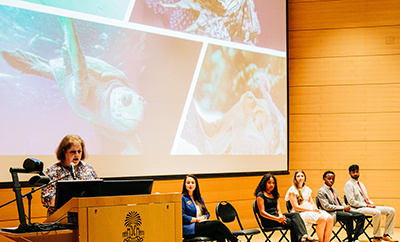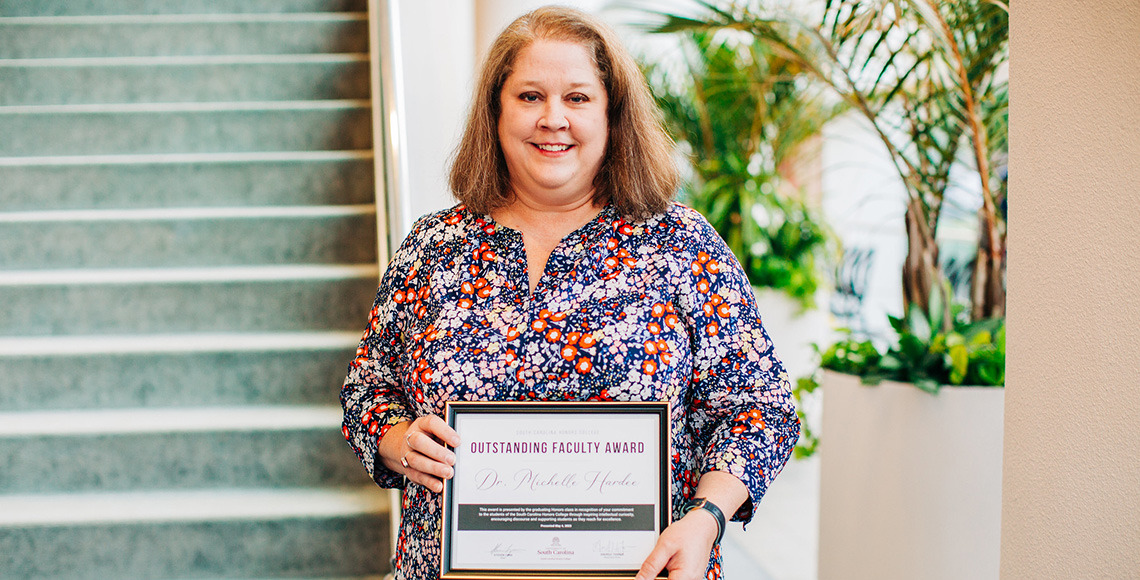On the first day of her Oceans and Society course, Michelle Hardee asks her students the same two questions: “How many of you are afraid of science or did not have a good experience in science?”
After 10 years of teaching non-majors, she can predict the response. “Ninety-nine times out of a hundred, they all raise their hands,” she says.
But Hardee has the antidote: pure fun. She starts each class with her famous “Crittercam,” underwater videos or footage of “a different weird organism.” Then there are the assignments students can tailor to their majors and a field trip to the South Carolina Aquarium in Charleston. Her engaging teaching style has brought her numerous thank you notes, students who keep in touch and send questions about hurricanes and climate change, even fresh eggs and homemade pear relish. And last spring, it brought her the 2023 South Carolina Honors College Outstanding Faculty Award.

“I felt so fortunate to take her course in my first semester of freshman year because she set such a high standard for the honors experience,” wrote Bella Crowe, ’23 social work, in her nomination letter. “She was always positive and inclusive, offered so many opportunities for further inquiry and allowed each of us to adapt the class to our learning styles and fields of study to leave our time together with meaningful takeaways. Four years later, I still think of the principles I learned in her class nearly every day.”
With winners nominated by the senior class, the Outstanding Faculty Award recognizes a professor who has facilitated conversation among honors students in class and influenced their lives and careers. Count Catherine Dixon, ’21 international business, and David Brake, ’20 sport and entertainment management, among them.
“Every time I go home, I talk my parents’ ears off about what we’ve been learning,” wrote Dixon in the note accompanying the eggs and pear relish.
“Learning so much about the environment and mankind’s impact on it in your class is one of the reasons I am considering specializing in environmental law!” wrote Brake, a J.D. candidate at Villanova University’s Charles Widger School of Law.
Knowing her honors students are rarely STEM majors — most are business, HRSM and humanities students — Hardee makes sure Oceans and Society doesn’t include problem sets or equations. That kind of detail is for marine science majors. She knows it’s simply not the kind of learning and thinking non-science majors need for a science course and can be what turns them “off” of science.
“You’re going to learn about the ocean and how it works,” she tells them, describing their surprise when they realize her course doesn’t focus solely on dolphins and whales and the human impact on their environment. Instead, Hardee makes sure her students understand how interconnected society and the oceans are. They discuss how various scientific disciplines affect the ocean — from the geology of oil and gas drilling to the physics of seismic testing to the chemistry of ocean acidification.
“It’s multidisciplinary,” Hardee says. “For them to understand how we impact oceans, they need to understand how oceans work in the first place. If they know the how and why of hurricanes, they understand the impacts better and the importance of helping to evacuate people. Same with the erosion of coastlines and why certain things don’t work, like jetties and groins and those sorts of things.”
A native of Dimmitt, Texas, a small, landlocked town near Amarillo, Hardee grew up wanting to work with dolphins and coral reefs. A zoology degree from Texas A&M University led to a master’s degree in marine biology at the College of Charleston’s Grice Marine Laboratory and her Ph.D. in marine science from the University of South Carolina.
Her years as a grad student and postdoctoral associate included field work off the California coastline and off the coast of New Zealand, and she was part of an ocean-drilling expedition in the Indian Ocean, pulling up samples of seafloor rock to help understand the boundary between the ocean crust and Earth’s mantle. For her master’s thesis, she collected and chemically analyzed ocean sediment samples containing tiny marine snails called pteropods, and in those shells she and her colleagues detected signs of ocean acidification. That was 1997.
“We didn’t know why they looked that way,” she said. “They were opaque instead of clear, and pitted, dissolved in spots.” It’d be another decade before scientists realized that such visual evidence of shells dissolving indicated the ocean was becoming more acidic, now a major area of research. Ocean acidification occurs when too much carbon dioxide from the atmosphere is absorbed by the ocean (normally a natural, balanced process) because carbon dioxide reacts with water to increase the acidity of the ocean. These ocean chemistry changes affect organisms ecosystem-wide by dissolving the shells of organisms such as mollusks and coral reefs and by reducing available food for animals up the food chain.
Having researched the ocean and the evidence of climate change recorded in the shells of ocean organisms and seafloor sediments for 26 years, Hardee can show her students how rapidly climate has changed solely during her academic career.
“I show each class what I showed the semester before, except the graphs showing data of temperature rise, sea level rise, extreme events, and other ocean and climate change indicators of human impact get higher and more extreme,” she says. “The graphs have to keep being adjusted to account for the rapid rise and changes we’re seeing. It’s not stopping, and it keeps getting worse and worse. We get into discussions about what we can do and how important it is to get governments and legislatures to make decisions. Otherwise, nothing happens.”
When the Intergovernmental Panel on Climate Change published its Fifth Assessment Report in 2014, Hardee brought its findings to her students — and broke down in front of them because it was so grim.
“Things are screwed up,” she told them between unexpected tears. “Y’all are going to bear the brunt of it. I’m sorry — our generation didn’t do enough. You’re going to have to live with it for a long time.”
Her reaction surprised her students. Some emailed her saying it was good to see humanity in the classroom.
“They were surprised I felt so strongly,” Hardee says. “But what they can do is mitigation. It’s not going back to the way it was.”
What the IPCC reported was doubly disturbing. Not only had human activity caused 95-100 percent of average global warming, but half of the carbon dioxide emissions that caused that warming over the last approximately 250 years occurred in the last 40 years. In short, people’s actions — through their burning of coal, oil and natural gas — have been overheating the planet faster than ever since the mid 1970s.
“When I started teaching in 2000, the scientific community was saying ‘if we curb or stop emissions now, we’ll be okay. We’ve got time.’ It’s not like that now. We’re now out of time,” she says. “My goal is to educate students enough to see the information out there and draw conclusions in their role, whatever that role is going to be.”
It shouldn’t be surprising that Hardee received the Outstanding Faculty Award. As program manager for the University of South Carolina’s Center for Teaching Excellence, she’s been leading training seminars for graduate student teaching assistants since 2012. She loves teaching — the practice and study of it — and thinks it’s important to understand that students are individuals with their own experiences and circumstances.
“They aren’t stock fixtures,” she says. “We should think of them as an entire person. They have a life and jobs and take care of their families. Understanding that makes you have a richer experience and be more flexible in the classroom. I try to stay empathetic to their perspectives.”
